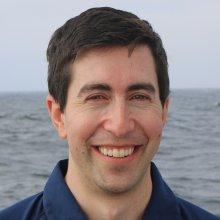
Jeffrey Marlow
Tell us about your work / research. What kinds of things do you do?
I study the role that microorganisms play in deep-sea environments and the amazing metabolic tools they have evolved to handle the challenging environmental conditions they face. Microbes can eat and breathe all kinds of chemicals, and many distinct forms of life have been found at unique geochemical sites at the seafloor. Understanding how these processes work can tell us about the fundamental limits of biology. Specifically, determining which organisms are metabolically active - not merely present - is a key priority of my research. This way, we can figure out how microbes control the chemical fluxes of the planet and may be useful in applications such as global warming mitigation or biofuel production.
What sparked your initial interest in your career?
Two different forces inspired me to go into science. The first was a family trip to Yellowstone, where I learned that life could somehow survive in superheated springs - that seemed so foreign to me based on the physical world I knew, and it showed that the possibilities of biology are much broader than I ever imagined. The second was the experience of watching a space shuttle launch in person: actually watching people go into space changed my idea of what was possible. In a lot of ways, studying extreme biology combines these two ideas - space exploration and the limits of biology.
Who influenced you or encouraged you the most?
My middle school science teachers took us to local streams and lakes, showing me that science happens in the real world! It's not just something you read in a textbook - it's a way of looking at the world that can transform the way you see the world around you.
What element of your work / study do you think is the most fascinating?
Less than 0.00001% of the deep sea has ever been observed, so with nearly every trip to the bottom of the ocean, we're seeing things no one has ever seen before!
What other jobs led you to your current career?
Most of my experience has been through scientific research affiliated with universities, studying microbes at shallow hydrothermal vents, deep sea methane seeps, volcanoes, acidic rivers, and other extreme locations. I've also worked on a few of NASA's Mars rover missions, looking for signs of habitability on the Red Planet. To share the science with a broader audience, I write magazine and newspaper articles and work with students around the world to explore their surroundings and follow their own interests.
What are your degrees and certifications?
B.A. in Earth and Planetary Science, Biochemistry, and Geobiology - Washington University in St. Louis 2007; M.Phil in Earth Science and Engineering - Imperial College London 2010; Ph.D. in Geobiology - California Institute of Technology 2015
What are your hobbies?
I like getting outside - camping, trail running, mountaineering, skiing - and traveling.
What advice would you give to someone who wants to have a career like yours?
Regardless of what specific scientific field you might want to go into, it's always useful to learn about other types of science. Staying informed about new findings and methods in molecular biology, bioinformatics, or chemistry will open new paths in marine microbiology. Always channeling your curiosity into new questions and ideas of how you might go about answering them helps develop the mind of a researcher.
How did you get involved in the Nautilus Exploration Program? How did you get on the ship?
The lab I work in had arranged to participate in a couple of Nautilus cruises, and I was thrilled to join! The combination of deep sea science and pure exploration is a unique strength of the program.
Expeditions
Jeffrey participated in the following Ocean Exploration Trust expeditions:
